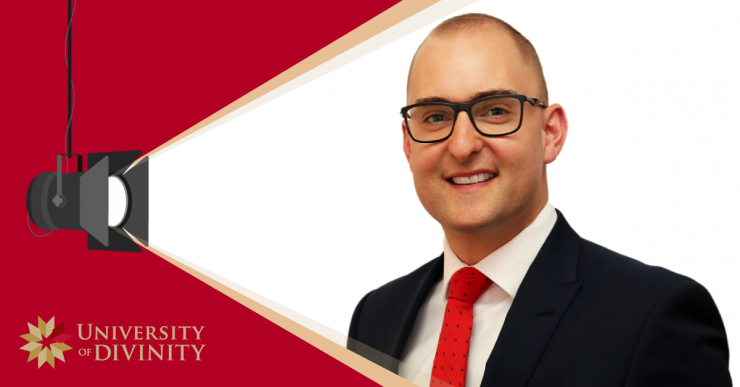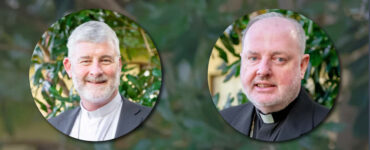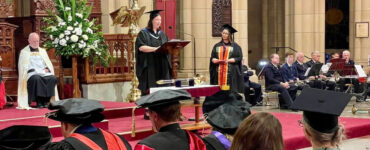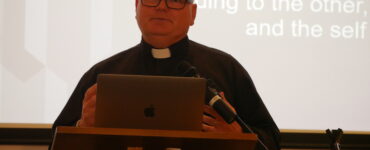Dr Aaron Lane is an Honorary Post-Doctoral Research Associate at the University of Divinity, based at Catholic Theological College. Aaron is an alumnus of the University of Divinity, graduating as a Vice-Chancellor’s Scholar in 2013 with a Graduate Diploma in Theology and a Master of Arts. He is a lawyer and holds a full-time academic appointment at RMIT University.
Welcome, Aaron! Tell us about your areas of research at the University of Divinity.
There are two stands to my research that I am currently pursuing with collaborators at the University of Divinity.
The first area is technological change and governance. By ‘governance’ I mean that set of customs and traditions, policies and procedures, institutions and so on that structure how groups make collective decisions. Sometimes we can be uncomfortable applying theory of corporate and (secular) organisational governance to the church. But the question of how the church makes decisions is at least as old as the apostles – and the Catholic and Orthodox traditions have a long history of church councils and more formal governance structures to draw on. Technological innovation could improve existing governance processes and could also offer new possibilities for governance. So, I am exploring – how has new technology lead to evolution of church governance structures over time?
The second area is developing moral and ethical frameworks for understanding new and emerging technologies. In St John Paul II’s first papal encyclical (Redemptor hominis, 1979), he taught that “the development of technology and the development of contemporary civilization, which is marked by the ascendancy of technology, demand a proportional development of morals and ethics.” This is no less true in our current times as regulators around the world grapple with how to treat new and emerging technologies (such as blockchain, artificial intelligence, machine learning, drones, etc.). So, I am also exploring what theology has to say about these use-cases and the implications for regulation and innovation policy more broadly.
What initially drew you to researching this area?
The two stands of my research are related to my full-time academic role at RMIT University. At RMIT, I am a Senior Lecturer in the Graduate School of Business and Law and a Senior Research Fellow in the RMIT Blockchain Innovation Hub. The BIH was established as the world’s first social science research centre to study the impact blockchain technology. My doctoral studies examined the relationship between regulation and innovation in a public sector context. The conceptual tools and analytic framework that I developed led directly to studying the law and economics of new and emerging technologies. It is exciting to be working at the frontiers and I enjoy the practical side of engagement-led research with our industry partners.
Who has been an important part of this research journey?
I am passionate about interdisciplinary scholarship. Recently, I attended the Catholic Theological College’s annual Cardinal Knox Lecture. There, the Rev. Prof. Austin Cooper (a past lecturer of mine) spoke of the importance of “great friendships” for success in reflecting on the 50-year anniversary of the college. This really resonated with me as I think friendships have been crucially important for my own research journey. While I have some sole authored publications, my three books and the majority of my journal articles are co-authored as part of various team combinations. I have “grown up” as a researcher alongside friends that have turned into co-authors. I have worked with co-authors that have turned into friends. So my advice – particularly to research students and early career researchers – is to spend time developing those great friendships.
The next are great mentors. During my doctoral studies, I had two supervisors who were an excellent team and treated me like a colleague-in-training. One provided a wealth of academic knowledge, wise counsel, and kept me disciplined and focused on publication and submission. One provided me with inspiration and several distractions for new and interesting research projects. In my view, having both kinds of mentors is crucial to longer term research success.
What have you learned from your recent research?
In one of my most recent papers, forthcoming in the Monash University Law Review, I conducted an empirical analysis of the Australian legal cases involving Bitcoin and cryptocurrencies. Focusing on criminal proceedings, the study finds that cryptocurrency has been considered in a variety of different legal contexts including bail decisions, criminal trials, and sentencing. The analysis shows that the use of cryptocurrency in the commission of an offence is seen by courts as an aggravating factor – meaning someone will receive a harsher sentence for committing crime with cryptocurrency than with cash or another payment method.
I think the stereotype that cryptocurrency is just used for criminal enterprises and illicit purposes is significantly exaggerated. But to displace those stereotypes hard-headed research is needed into the “darker” side of the use of new and emerging technology.
How has your experience working in law affected your perspective on theology and the church?
I actually I began my MA in Theology straight after my legal studies and completed it alongside full-time legal practice – but I think the law certainly influenced the way I approach theology. Identifying sources of authority, grappling with definitions, interpreting texts, and considering the relationship between texts and traditions are all important to both fields. A strong influence on my legal thinking is the Harvard Law Professor Laurence Lessig, and one of his key insights is that there are other modes of regulating human behaviour besides the man-made laws of legislation and court judgements. In this sense, the divine law – which theology seeks to understand, and which church seeks to bear witness – acts to steer human behaviour towards the common good.
What impact do you hope your research has on the churches and community in Australia and internationally?
To return to the two areas of research that I am pursing with the University of Divinity. I hope that my research on governance can inform current discourse within the Roman Catholic Church around collective decision-making issues including synodality and new models for parish organisation. I hope that my work on new and emerging technologies can contribute to a public theology around these issues as we seek to promote greater dignity, freedom, and human flourishing in the digital age.







Add comment